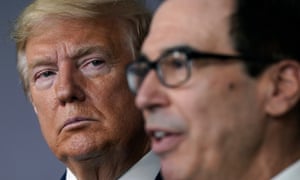‘For the time being, politicians are adopting a bipartisan approach to coping with the crisis, and that’s entirely understandable.’ Donald Trump and Steven Mnuchin at a White House press conference on Tuesday. Photograph: Drew Angerer/Getty Images
It is as if the lights have been switched off. The global economy has been plunged into darkness as countries hunker down in response to the Covid-19 pandemic.
Most recessions develop gradually over time. When the last one started in 2008 it took the Bank of England six months to spot it. This time it is different. Then it was a financial virus, this time it is the real thing. Commentators often say the economy is hitting the wall or is falling off a cliff on the weakest of evidence. Today the cliches are horrifyingly true.
On some estimates the UK economy is on course to shrink by 15% in the second quarter of 2020. That is not a recession, it is a collapse surpassing anything in modern times, including the Great Depression.
When the banks were bailed out in 2008, it was because policymakers feared precisely what is now happening: a complete shutdown of the global economy. The rescue package worked, but only just. The early indications from China are that the impact of Covid-19 is markedly greater than that of the financial crisis, itself the most severe downturn of the postwar era.
This was a crisis that could and should have been predicted but, as in the years leading up to 2008, policymakers have been complacent and financial markets in denial about the risks.
Late in the day though it is, lessons need to be learned from 2008. The response not only has to be big and bold, it also has to be coordinated. Yet the international community went into this crisis with a row between two of the biggest oil producers – Russia and Saudi Arabia – driving down the cost of crude, and China and the US embroiled in a trade war. The pandemic has highlighted the need to work together for both public health and economic stability reasons.
Sadly, the world has rarely looked less prepared to act in concert and that matters, because this time it is not the banks that need bailing out, it is the people. Some are able to work from home: millions are not. Covid-19 is already a health crisis; it is set to be an economic crisis too.
A month ago, when financial markets belatedly woke up to the threat posed by Covid-19, the assumption was that there would be a painful but relatively short shock. But even if countries have emerged from quarantine by the summer – a very big if – the speed of economic recovery is going to depend on the collateral damage caused in the meantime: how many businesses go bust; whether laid-off workers have reached the limit of their credit cards to pay the regular monthly bills; the time it takes for confidence to return.
Politicians are starting to use the language, and deploying the policies, of wartime. The UK government wants manufacturers to switch production lines to making ventilators in the same way that factories switched from consumer goods to making planes and tanks.
They are also adopting the language and policies of the left: the need for social solidarity, the importance of intervening to help struggling firms, the urgency of bailouts for hard-hit industries. In a battle for economic survival the constraints of peacetime have to be ditched. When the chancellor, Rishi Sunak, said this was not a time for ideology or orthodoxy, what he really meant was that this was not time for free-market ideology or orthodoxy. Just as in 1940, the size of the budget deficit is seen as irrelevant. All sorts of hitherto taboo policies become possible.
Central banks have provided the first line of defence. They have cut interest rates and begun pumping money into the financial system through the process known as quantitative easing (QE). It is a sign of how the once unconventional quickly becomes part of the mainstream that QE is now seen as being a regular part of a central bank’s armoury.
This time too the once unthinkable will eventually become not just feasible but desirable. Milton Friedman said that governments could always prevent a slump if they were prepared to load helicopters with money and rain it down on the populace. Provided the public thought the cash didn’t have to be paid back, they would increase their spending and lift the economy out of recession.
Governments have always harboured grave doubts about helicopter money. It involves finance ministries ordering central banks to finance tax cuts, cash handouts or public spending increases through the printing of money and so brings into question central bank independence. An even stronger objection is that it leads to hyperinflation and ends – as in the Germany of 1923 – with people trundling wheelbarrows of worthless cash to the shops.
But for now what should be scaring policymakers is the risk that the world economy is heading for the Germany of 1932, when unemployment hit six million and a failure to abandon orthodox policies led to the rise of fascism.
It is as if the lights have been switched off. The global economy has been plunged into darkness as countries hunker down in response to the Covid-19 pandemic.
Most recessions develop gradually over time. When the last one started in 2008 it took the Bank of England six months to spot it. This time it is different. Then it was a financial virus, this time it is the real thing. Commentators often say the economy is hitting the wall or is falling off a cliff on the weakest of evidence. Today the cliches are horrifyingly true.
On some estimates the UK economy is on course to shrink by 15% in the second quarter of 2020. That is not a recession, it is a collapse surpassing anything in modern times, including the Great Depression.
When the banks were bailed out in 2008, it was because policymakers feared precisely what is now happening: a complete shutdown of the global economy. The rescue package worked, but only just. The early indications from China are that the impact of Covid-19 is markedly greater than that of the financial crisis, itself the most severe downturn of the postwar era.
This was a crisis that could and should have been predicted but, as in the years leading up to 2008, policymakers have been complacent and financial markets in denial about the risks.
Late in the day though it is, lessons need to be learned from 2008. The response not only has to be big and bold, it also has to be coordinated. Yet the international community went into this crisis with a row between two of the biggest oil producers – Russia and Saudi Arabia – driving down the cost of crude, and China and the US embroiled in a trade war. The pandemic has highlighted the need to work together for both public health and economic stability reasons.
Sadly, the world has rarely looked less prepared to act in concert and that matters, because this time it is not the banks that need bailing out, it is the people. Some are able to work from home: millions are not. Covid-19 is already a health crisis; it is set to be an economic crisis too.
A month ago, when financial markets belatedly woke up to the threat posed by Covid-19, the assumption was that there would be a painful but relatively short shock. But even if countries have emerged from quarantine by the summer – a very big if – the speed of economic recovery is going to depend on the collateral damage caused in the meantime: how many businesses go bust; whether laid-off workers have reached the limit of their credit cards to pay the regular monthly bills; the time it takes for confidence to return.
Politicians are starting to use the language, and deploying the policies, of wartime. The UK government wants manufacturers to switch production lines to making ventilators in the same way that factories switched from consumer goods to making planes and tanks.
They are also adopting the language and policies of the left: the need for social solidarity, the importance of intervening to help struggling firms, the urgency of bailouts for hard-hit industries. In a battle for economic survival the constraints of peacetime have to be ditched. When the chancellor, Rishi Sunak, said this was not a time for ideology or orthodoxy, what he really meant was that this was not time for free-market ideology or orthodoxy. Just as in 1940, the size of the budget deficit is seen as irrelevant. All sorts of hitherto taboo policies become possible.
Central banks have provided the first line of defence. They have cut interest rates and begun pumping money into the financial system through the process known as quantitative easing (QE). It is a sign of how the once unconventional quickly becomes part of the mainstream that QE is now seen as being a regular part of a central bank’s armoury.
This time too the once unthinkable will eventually become not just feasible but desirable. Milton Friedman said that governments could always prevent a slump if they were prepared to load helicopters with money and rain it down on the populace. Provided the public thought the cash didn’t have to be paid back, they would increase their spending and lift the economy out of recession.
Governments have always harboured grave doubts about helicopter money. It involves finance ministries ordering central banks to finance tax cuts, cash handouts or public spending increases through the printing of money and so brings into question central bank independence. An even stronger objection is that it leads to hyperinflation and ends – as in the Germany of 1923 – with people trundling wheelbarrows of worthless cash to the shops.
But for now what should be scaring policymakers is the risk that the world economy is heading for the Germany of 1932, when unemployment hit six million and a failure to abandon orthodox policies led to the rise of fascism.
When Jeremy Corbyn was running to be leader of the Labour party in 2015 he flirted with the idea of People’s QE, by which he meant using the money created by the Bank of England to support a green transformation of the economy. It was seen as wildly irresponsible at the time and was quickly ditched.
This week, Jim O’Neill, a former Goldman Sachs chief economist and minister under David Cameron, said there should be cash handouts so people can feed themselves and pay their household bills during the crisis. And what did he call it? People’s QE. Hong Kong has decided to give all residents a cash handout; Donald Trump wants to do the same in the US.
For the time being, politicians are adopting a bipartisan approach to coping with the crisis, and that’s entirely understandable. But at the end of the second world war the public asked themselves a simple question: if a more interventionist approach was right in wartime, why not try it in peacetime? When the Covid-19 crisis is over, as it eventually will be, they might well ask the same question.

